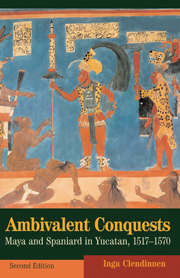Book contents
- Frontmatter
- Contents
- List of illustrations
- Preface to the second edition
- Preface to the first edition
- Acknowledgments
- Map I Yucatan in the conquest period
- Part I Spaniards
- Part II Indians
- 9 Finding out
- 10 Connections
- 11 Continuities
- 12 Assent
- Epilogue: Confusion of tongues
- Appendix: A sampler of documents
- Glossary of Spanish and Maya terms
- Notes
- Select bibliography
- Index
11 - Continuities
Published online by Cambridge University Press: 05 October 2013
- Frontmatter
- Contents
- List of illustrations
- Preface to the second edition
- Preface to the first edition
- Acknowledgments
- Map I Yucatan in the conquest period
- Part I Spaniards
- Part II Indians
- 9 Finding out
- 10 Connections
- 11 Continuities
- 12 Assent
- Epilogue: Confusion of tongues
- Appendix: A sampler of documents
- Glossary of Spanish and Maya terms
- Notes
- Select bibliography
- Index
Summary
They did not wish to join with the foreigners; they did not desire Christianity. They did not wish to pay tribute, did those whose emblems were the bird, the precious stone, the flat precious stone and the jaguar, those with the three magic emblems. Four four-hundreds of years and fifteen score years was the end of their lives; then came the end of their lives, because they knew the measure of their days. Complete was the month; complete, the year; complete, the day; complete, the night; complete, the breath of life as it passed also; complete, the blood, when they arrived at their beds, their mats, their thrones. In due measure did they recite the good prayers; in due measure they sought the lucky days, until they saw the good stars enter into their reign; then they kept watch while their reign of the good stars began. Then everything was good.
Then they adhered to the dictates of their reason. There was no sin; in the holy faith their lives were passed. There was then no sickness; they had then no aching bones; they had then no high fever; they had then no smallpox; they had then no burning chest; they had then no abdominal pains; they had then no consumption; they had then no headache. At that time the course of humanity was orderly.
The foreigners made it otherwise when they arrived here. They brought shameful things when they came …
The Book of Chilam Balam of Chumayel- Type
- Chapter
- Information
- Ambivalent ConquestsMaya and Spaniard in Yucatan, 1517–1570, pp. 154 - 160Publisher: Cambridge University PressPrint publication year: 2003

